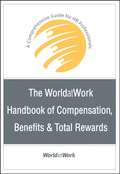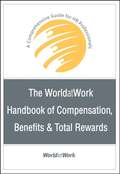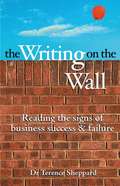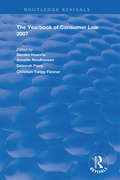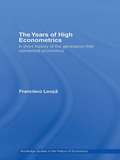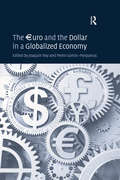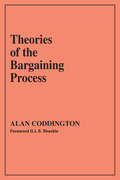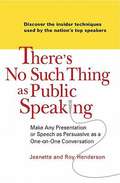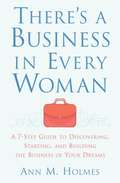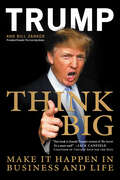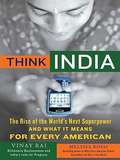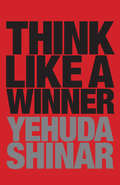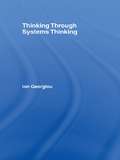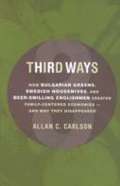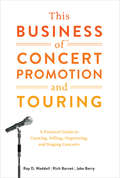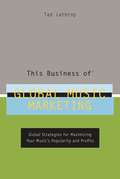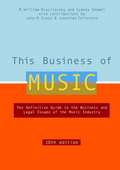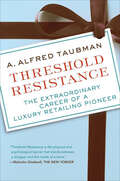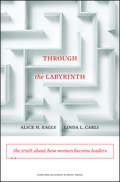- Table View
- List View
The WorldatWork Handbook of Compensation, Benefits and Total Rewards: A Comprehensive Guide for HR Professionals
by WorldatWorkPraise for The WorldatWork Handbook of Compensation, Benefits & Total Rewards This is the definitive guide to compensation and benefits for modern HR professionals who must attract, motivate, and retain quality employees. Technical enough for specialists but broad in scope for generalists, this well-rounded resource belongs on the desk of every recruiter and HR executive. An indispensable tool for understanding and implementing the total rewards concept, the WorldatWork Handbook of Compensation, Benefits, and Total Rewards is the key to designing compensation practices that ensure organizational success. Coverage includes: Why the total rewards strategy works Developing the components of a total rewards program Common ways a total rewards program can go wrong Designing and implementing a total rewards program Communicating the total rewards vision Developing a compensation philosophy and package FLSA and other laws that affect compensation Determining and setting competitive salary levels And much more
The Worldatwork Handbook of Compensation, Benefits and Total Rewards
by WorldatworkPraise for The WorldatWork Handbook of Compensation, Benefits & Total Rewards: This is the definitive guide to compensation and benefits for modern HR professionals who must attract, motivate, and retain quality employees. Technical enough for specialists but broad in scope for generalists, this well-rounded resource belongs on the desk of every recruiter and HR executive. An indispensable tool for understanding and implementing the total rewards concept, the WorldatWork Handbook of Compensation, Benefits, and Total Rewards is the key to designing compensation practices that ensure organizational success. Coverage includes: Why the total rewards strategy works Developing the components of a total rewards program Common ways a total rewards program can go wrong Designing and implementing a total rewards program Communicating the total rewards vision Developing a compensation philosophy and package FLSA and other laws that affect compensation Determining and setting competitive salary levels And much more.
The Writing on the Wall
by Terence SheppardThousands of businesses, large and small, fail every year. According to The Writing on the Wall most instances of business failure begin with early warning signs of trouble, which are clearly discernible, provided we know where to look and what to look for. Targeted at managers and business owners who want to avoid the mistakes made by many businesses, this book highlights the common pitfalls that lead to business failure, and aims to assist readers to identify where their business may be off track and provide advice on what they can do about it before it\'s too late. Author Dr Terence Sheppard is a management consultant with over 25 years experience in lecturing, consulting and business management.
The Yearbook of Consumer Law 2007 (Routledge Revivals)
by Christian Twigg-Flesner Geraint Howells Annette Nordhausen Deborah ParryFirst published in 2007, The Yearbook of Consumer Law provides a valuable guide to developments in the consumer law field with a domestic, regional and international dimension. The volume presents a range of peer-reviewed scholarly articles, analytical in approach and focusing on specific areas of consumer law such as sales, credit and safety, as well as more general issues, such as consumer law theory. The book also includes a section dedicated to significant developments during the period covered, such as key legislative developments or important court decisions. The book provides an essential resource for all those, academic and practitioner, working in the areas of consumer law and policy.
The Years of High Econometrics: A Short History of the Generation that Reinvented Economics (Routledge Studies in the History of Economics)
by Francisco LouçãA fascinating and comprehensive history, this book explores the most important transformation in twentieth century economics: the creation of econometrics. Containing fresh archival material that has not been published before and taking Ragnar Frisch as the narrator, Francisco Louca discusses both the keys events - the establishment of the Econometric Society, the Cowles Commission and the journal Econometrica – and the major players - economists like Wesley Mitchell, mathematicians like John von Neumann and statisticians like Karl Pearson - in history that shaped the development of econometrics. He discusses the evolution of their thought, detailing the debates, the quarrels and the interrogations that crystallized their work and even offers a conclusion of sorts, suggesting that some of the more influential thinkers abandoned econometrics or became critical of its development. International in scope and appeal, The Years of High Econometrics is an excellent accompaniment for students taking courses on probability, econometric methods and the history of economic thought.
The €uro and the Dollar in a Globalized Economy
by Pedro Gomis-PorquerasThe dollar has been the dominant currency of the world economy for almost a century; since 2002, the euro has gained widespread international acceptance resulting in important institutional, economic and financial changes both for the euro zone, the United States and the world economies, affecting foreign exchange and financial markets as well as economic activities around the world. In years to come, the international role of the euro will hinge on the validity of the fundamental idea underlying its creation, namely that important components of sovereignty can be pooled and shared among nations in the pursuit of common economic and political objectives. This key book assesses the international role of the euro, discusses its impact on global financial markets, shifting global exchange rate relationships and their implications. With input from various disciplines (economics, business and political science), it foments discussions intended to facilitate an exchange of ideas among academics, practitioners and the local business community.
ThedaCare: System Strategy
by Michael E. Porter Sachin H JainOver the 1980s and 1990s, America's changing health care payer environment resulted in mergers of numerous community hospitals into hospital systems. Based in Appleton, Wisconsin, ThedaCare stood out among community hospital systems in its pursuit of service rationalization, clinical quality improvement, and value-based delivery. Driven by determined leadership, ThedaCare began site-based service line rationalization and introduced innovative care delivery models. ThedaCare is a metaphor for the challenges of transforming American community hospital systems. Can be used to teach: the evolution of structure, organization, and strategy of U.S.-based community hospital systems; integrated practice units and care cycles; management of health care quality improvement processes; challenges in diffusion of care delivery innovation; and cost transparency and quality measurement.
ThedaCare: System Strategy
by Michael E. Porter Sachin H JainOver the 1980s and 1990s, America's changing health care payer environment resulted in mergers of numerous community hospitals into hospital systems. Based in Appleton, Wisconsin, ThedaCare stood out among community hospital systems in its pursuit of service rationalization, clinical quality improvement, and value-based delivery. Driven by determined leadership, ThedaCare began site-based service line rationalization and introduced innovative care delivery models. ThedaCare is a metaphor for the challenges of transforming American community hospital systems. Can be used to teach: the evolution of structure, organization, and strategy of U.S.-based community hospital systems; integrated practice units and care cycles; management of health care quality improvement processes; challenges in diffusion of care delivery innovation; and cost transparency and quality measurement.
Theories of the Bargaining Process
by Alan CoddingtonA tour de force of theoretical reasoning, this book presents the most advanced analytical model of the bargaining process so far conceived. Focused essentially on the dynamics of the bargaining process, Coddington's model employs elements of several conceptual constructs--individual decision-making, theories of expectations and their adjustment, and environment concepts--to explain the nature of consistency in a bargainer's system of expectations and intentions.The book begins with a description of the bargaining process in an economic context and establishes an analytical framework. There follows a critical survey of bargaining theory in which the author selects those concepts, which he finds most valid and most applicable to his decision-making/expectation/adjustment model. The internal consistency of a wide class of bargaining models is then examined in a chapter on the relationship between decision-making and expectations. Since the theory of games has been used as a basis for bargaining process theory, the author devotes a chapter to an examination of the game-theoretic approach and an assessment of its value relative to his own approach.The author concludes with a study of the specific capabilities of his own analytical model, with discussion of the possible combinations of assumptions with which the investigator may work. Although stemming from a problem in economic theory and of immediate intent to economists, the book's contribution to the general theory of conflict process and interdependent decision-making make it an important study for students of politics and international affairs as well as management and labor relations specialists.
There's No Such Thing as Public Speaking
by Jeanette And HendersonTwo top public-speaking coaches offer fresh advice on giving effective speeches and presentations with the immediacy of a conversation. The best speeches don't sound like speeches, and the best speakers make listeners feel as though they are being addressed directly. The trick is to make every presentation as natural and direct as a one-on-one conversation. This expert but accessible guide reveals: - The six truths behind every conversation-and how to use them at the podium - The three steps to inspiring any audience - The seven secrets for using voice and body language - The seven tools every speaker uses or misuses Whether addressing a few colleagues or a packed auditorium, readers will find practical and simple techniques for inspiring every listener. .
There's a Business in Every Woman: A 7-Step Guide to Discovering, Starting, and Building the Business of Your Dreams
by Ann Holmes“Ann Holmes has created the perfect guide to help women turn their dreams into a reality.” –Donna Mullen Good, CEO of the Center for Women & EnterpriseIf you’ve ever dreamed of starting your own business, or if you’ve ever wondered about how to build up the business you already run, but worry because you don’t have an MBA or a couple of years of college business courses, this book is for you. Based on extensive interviews with more than eighty women entrepreneurs from around the country, There’s a Business in Every Woman offers inspiring success stories (and instructive missteps) in a wide range of businesses–from catering, landscaping, personal training, and wedding and events planning to interior and clothing design, staffing, manufacturing, and product design.What the trailblazing women in this book have in common is a good idea and the courage to turn a dream into a money-making reality through hard work, passion, and drive. Take, for instance, the woman who started an IT consulting company in her basement and now has more than a thousand employees in three states; two jogging buddies who commiserated about their uncomfortable bras and went on to design and produce a jog bra, creating a company that Playtex ultimately bought for millions; the mom whose hand-made birthday-party invitations made such a splash that she launched her own custom party invitation company, which she expanded to include holiday cards, gift tags, bags, and more; the sixty-five-year-old corporate wife and mother who applied her domestic talents to opening a profitable B&B; the twenty-three-year-old who bought a fledging real estate franchise and now earns a healthy six figures annually.These success stories highlight the practical: focusing on what you’re good at; setting up your business properly–even if you are starting out from your basement or garage; getting financial backing when you need it; marketing your products with sizzle; networking like the “good old boys”; understanding how and when to diversify your products or services; managing your growth; and, most important, knowing what your company is worth and when it might be lucrative to cash out.An accessible crash course in starting and running your own business, There’s a Business in Every Woman will teach you everything you need to know to turn your pipedream into serious profits.
Think Big: Make It Happen in Business and Life
by Donald J. Trump Bill ZankerDonald J. Trump is an icon: the very definition of the American success story. President-elect, reality-television star, and developer of some of the planet's most prestigious real estate, he's also become one of the world's wealthiest men.Trump is a living example of how thinking BIG and knowing when to back up your opinions aggressively—regardless of what your critics or opponents might say—can help you maximize your personal and professional achievements. In his first political campaign, Trump defeated his opponents by rallying voters nationwide to "Make America Great Again." For the first time ever, you too can learn Trump’s secrets to thinking BIG and kicking ass! Learn:Momentum: the Big Mo. How to get it and how to get it back.Revenge: how and when to get it (and why it's so sweet)."I love you, now sign this!" Why contracts in business and personal life are so important.Real-life stories from people who've applied the think BIG formula in their own lives.These strategies are proven and attested to by those who've learned to think BIG from Donald Trump and found success in their own lives even when the world seems to be against them. Co-authored with Bill Zanker, an entrepreneur who learned these tactics firsthand from Trump, Think BIG and Kick Ass shows you how to bring a winning attitude to everything you do.
Think India
by William L. Simon Vinay RaiWith 1. 1 billion residents, the world's largest democracy is poised to dominate the world stage. Vinay Rai, one of India's wealthiest men, gives an insider's view into his country's dynamic transformation, revealing the forces and unique characteristics behind India's meteoric rise.
Think Like a Winner
by Yehuda ShinarYehuda Shinar's secret is simple. To be a winner you need to learn to think like one. Based on scientific research carried out over the last 18 years, Yehuda Shinar has devised a set of winning behaviour principles that can be adapted and applied to any sphere of life. Using practical advice, quizzes, tests and real-life case studies Yehuda shows you how to transform your thought patterns so that whoever you are and whatever you want to achieve, you'll be one of life's winners. From conquering your self-defeating thoughts and winning the respect of others to clinching that promotion at work or winning in love, money and health, this book will give you the advantage over other people, equipping you with the tools you need to be succesful.
Thinking Through Systems Thinking
by Ion GeorgiouSystemicity is receiving wider attention thanks to its evident paradox. On the one hand, it occurs as a problem with complex symptoms. On the other, it is sought after as an approach for dealing with the non-linear reality of the world. At once problem and prize, systemicity continues to confound. This book details the mechanics of this paradox as they arise from human epistemological engagement with the world. Guided by an original analysis of the fundamental idea of emergent property, Thinking Through Systems Thinking uncovers the distinct significance, but also incompleteness, of the systems approach as a theory of human epistemological engagement. The incompleteness is treated through a non-eclectic interdisciplinary investigation which meets ten distinctly developed criteria required of any potential interdisciplinary partner to systems thinking. There results a theory of knowledge – an epistemology - which is systemic in both senses of the term: it belongs to the general systems movement, and it is systemically structured. The systems movement is thus offered a distinct epistemological voice which can compete on equal ground with other philosophical/epistemological positions. In true systemic fashion, this theory of knowledge also offers methodological, ethical, and existential implications.
Third Ways: How Bulgarian Greens, Swedish Housewives, and Beer-swilling Englishmen Created Family-centered Economies--and Why They Disappeared
by Allan C. CarlsonThis volume examines a very different search among some Europeans and North Americans for a Third Way, a form of social and economic organization that in important respects would be neither capitalist nor Communist. Freewheeling capitalism or collectivist communism: when it came to political-economic systems, did the twentieth century present any other choice? Does our century? InThird Ways,social historian Allan Carlson tells the story of how different thinkers from Bulgaria to Great Britain created economic systems during the twentieth century that were by intent neither capitalist nor communist. Unlike fascists, these seekers were committed to democracy and pluralism. Unlike liberal capitalists, they refused to treat human labor and relationships as commodities like any other. And unlike communists, they strongly defended private property and the dignity of persons and families. Instead, the builders of these alternative economic systems wanted to protect and renew the "natural" communities of family, village, neighborhood, and parish. They treasured rural culture and family farming and defended traditional sex roles and vital home economies. Carlson's book takes a fresh look at distributism, the controversial economic project of Hilaire Belloc and G. K. Chesterton which focused on broad property ownership and small-scale production; recovers the forgotten thought of Alexander Chayanov, a Russian economist who put forth a theory of "the natural family economy"; discusses the remarkable "third way" policies of peasant-led governments in post-World War I Bulgaria, Poland, and Romania; recounts the dramatic and largely unknown effort by Swedish housewives to defend their homes against radical feminism; relates the iconoclastic ideas of economic historian Karl Polanyi, including his concepts of "the economy without markets" and "the great transformation"; and praises the efforts by European Christian Democrats to build a moral economy on the concept ofhomo religious-"religious man. " Finally, Carlson's work explains why these efforts-at times rich in hope and prospects-ultimately failed, often with tragic results. The tale inspires wistful regret over lost opportunities that, if seized, might have spared tens of millions of lives and forestalled or avoided the blights of fascism, Stalinism, socialism, and the advent of the servile state. And yet the book closes with hope, enunciating a set of principles that could be used today for invigorating a "family way" economy compatible with an authentic, healthy, and humane culture of enterprise.
This Business of Concert Promotion and Touring: A Practical Guide to Creating, Selling, Organizing, and Staging Concerts
by Ray D. Waddell Jake Berry Rich BarnetThe only book that looks at the business of concert promotion. Concerts are part art, part party--and a big part business. This Business of Concert Promotion and Touring is the first to focus on that all-important business aspect, from creating a show, to selling a show, to organizing the show, to staging the show. Working with venues, personnel, booking, promoting, marketing, publicity, public relations, financial management, and much more are covered in this indispensable one-volume resource. And the ideas and techniques explained here can be used for every type of concert promotion, including college shows, artist showcases, club gigs, as well as major events handled by local promoters, nationwide promoters, and worldwide promoters. Concert promoters and tour managers at every level need to know This Business of Concert Promotion and TouringFrom the Hardcover edition.
This Business of Global Music Marketing: Global Strategies for Maximizing Your Music's Popularity and Profits
by Tad LathropThink BIG--capture the global music market.Worldwide tours, internet downloads, international album distribution-the global market for music is expanding with lightning speed, and that means big opportunities for everyone in the music business. The main obstacle? Lack of knowledge. The world market is packed with opportunity, but it's also full of cultural, regulatory, administrative, legal, political, and logistical pitfalls. This Business ofTM Global Music Marketing offers a map of the world, with full information on how to break into the global market, how to distribute records abroad, how to find an audience, how to package records to appeal to local markets, how to establish partnerships with foreign businesses, how to deal with different rules of trade, and much more. A companion volume to author Tad Lathrop's top-selling This Business ofTM Music Marketing and Promotion, This Business ofTM Global Music Marketing offers everyone in the music business a chance to go global.
This Business of Music: The Definitive Guide to the Music Industry
by John M. Gross M. William Krasilovsky Sidney Shemel Jonathan FeinsteinThe bible of the music industry! Now in its tenth edition, This Business of Music has been revised and completely updated to reflect the latest changes in the ever-evolving music business. Every chapter has been revised. An entirely new chapter has been added, asking and answering the question "Are there borders in cyberspace?" The answer is yes, and the book clearly and concisely explains what they are and how to maintain them. Commentary on recent legislation, a reader-friendly summary of the laws on copyright duration, and much more insightful analysis--plus fully updated lists of music organizations and important websites--make This Business of Music indispensable for musicians, agents, managers, marketers, music publishers and groups, colleges and universities, and everyone who wants to make music and make money.
Thomas J. Watson, IBM and Nazi Germany
by Geoffrey G. Jones Adrian BrownConsiders the strategy of U.S.-owned IBM, then a manufacturer of punch cards, in Nazi Germany before 1937. Opens with IBM CEO Thomas J. Watson meeting Adolf Hitler in his capacity as President of the International Chamber of Commerce. IBM had acquired a German company in 1922, and like other American companies, found itself operating after 1933 in a country whose government violently suppressed political dissent and engaged in intimidation and discrimination against Jews. Explores the tensions between IBM's German affiliate and its parent, and provides an opportunity to explore the options and responsibilities of multinationals with investments in politically reprehensible regimes.
Thomas J. Watson, IBM and Nazi Germany
by Geoffrey G. Jones Adrian Brown Grace BallorConsiders the strategy of U.S.-owned IBM, then a manufacturer of punch cards, in Nazi Germany before 1937. Opens with IBM CEO Thomas J. Watson meeting Adolf Hitler in his capacity as President of the International Chamber of Commerce. IBM had acquired a German company in 1922, and like other American companies, found itself operating after 1933 in a country whose government violently suppressed political dissent and engaged in intimidation and discrimination against Jews. Explores the tensions between IBM's German affiliate and its parent, and provides an opportunity to explore the options and responsibilities of multinationals with investments in politically reprehensible regimes.
Threshold Resistance: The Extraordinary Career of a Luxury Retailing Pioneer
by A. Alfred TaubmanIn this candid memoir, A. Alfred Taubman explains how a dyslexic Jewish kid from Detroit grew up to be a billionaire retailing pioneer, an intimate of European aristocrats and Palm Beach socialites, a respected philanthropist and, at age 78, a federal prisoner. With a unique blend of humor and genius, Taubman shows how selling fine art and antiques really isn't that different from marketing root beer or football, and offers penetrating insights into that quintessential palace of commerce, the luxury shopping mall. Alfred Taubman may not have invented the modern shopping center but, in the words of The New Yorker, "he perfected it."Taubman's life has been a storybook success, with its share of unique challenges. A pioneer builder and innovative real estate developer, he was also a brilliant land speculator, operator of a quick-serve restaurant chain, and owner of a major department store company. But what seemed like the pinnacle of his career, buying and reinventing the venerable art auction house Sotheby's, would lead to his conviction in an international price fixing scandal.Despite the twists and turns, Taubman's life and business philosophy can be summed up in one evocative phrase: Threshold Resistance. Understanding and defeating that force—breaking down the barriers between art and commerce, between shoppers and merchandise, between high culture and popular taste—has been his life's work.
Through the Labyrinth
by Alice H. Eagly Linda L. CarliDespite real progress, women remain rare enough in elite positions of power that their presence still evokes a sense of wonder. In Through the Labyrinth, Alice Eagly and Linda Carli examine why women's paths to power remain difficult to traverse. First, Eagly and Carli prove that the glass ceiling is no longer a useful metaphor and offer seven reasons why. They propose the labyrinth as a better image and explain how to navigate through it. This important and practical book addresses such critical questions as: How far have women actually come as leaders? Do stereotypes and prejudices still limit women's opportunities? Do people resist women's leadership more than men's? And, do organisations create obstacles to women who would be leaders?This book's rich analysis is founded on scientific research from psychology, economics, sociology, political science, and management. The authors ground their conclusions in that research and invoke a wealth of engaging anecdotes and personal accounts to illustrate the practical principles that emerge. With excellent leadership in short supply, no group, organisation, or nation can afford to restrict women's access to leadership roles. This book evaluates whether such restrictions are present and, when they are, what we can do to eliminate them.
Through the Labyrinth
by Alice H. Eagly Linda L. CarliDespite real progress, women remain rare enough in elite positions of power that their presence still evokes a sense of wonder. In Through the Labyrinth, Alice Eagly and Linda Carli examine why women's paths to power remain difficult to traverse. First, Eagly and Carli prove that the glass ceiling is no longer a useful metaphor and offer seven reasons why. They propose the labyrinth as a better image and explain how to navigate through it. This important and practical book addresses such critical questions as: How far have women actually come as leaders? Do stereotypes and prejudices still limit women's opportunities? Do people resist women's leadership more than men's? And, do organisations create obstacles to women who would be leaders?This book's rich analysis is founded on scientific research from psychology, economics, sociology, political science, and management. The authors ground their conclusions in that research and invoke a wealth of engaging anecdotes and personal accounts to illustrate the practical principles that emerge. With excellent leadership in short supply, no group, organisation, or nation can afford to restrict women's access to leadership roles. This book evaluates whether such restrictions are present and, when they are, what we can do to eliminate them.

